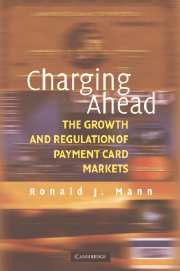Book contents
- Frontmatter
- Contents
- Figures and Tables
- Acknowledgments
- Introduction
- PART I THE BASICS OF PAYMENT CARDS
- PART II EASY MONEY
- PART III THE PUZZLE OF PAYMENT CARDS
- PART IV REFORMING PAYMENT SYSTEMS
- 11 Indirect Approaches: Regulating Interchange and Encouraging Surcharges
- 12 Contract Design
- 13 Regulating Information
- 14 Product Design: Affinity and Rewards Programs and Teaser Rates
- PART V OPTIMIZING CONSUMER CREDIT MARKETS AND BANKRUPTCY POLICY
- Conclusion
- Appendix: Country-Level Data
- Notes
- Bibliography
- Index
13 - Regulating Information
Published online by Cambridge University Press: 06 July 2010
- Frontmatter
- Contents
- Figures and Tables
- Acknowledgments
- Introduction
- PART I THE BASICS OF PAYMENT CARDS
- PART II EASY MONEY
- PART III THE PUZZLE OF PAYMENT CARDS
- PART IV REFORMING PAYMENT SYSTEMS
- 11 Indirect Approaches: Regulating Interchange and Encouraging Surcharges
- 12 Contract Design
- 13 Regulating Information
- 14 Product Design: Affinity and Rewards Programs and Teaser Rates
- PART V OPTIMIZING CONSUMER CREDIT MARKETS AND BANKRUPTCY POLICY
- Conclusion
- Appendix: Country-Level Data
- Notes
- Bibliography
- Index
Summary
The most intriguing response to the problems with credit card borrowing is to alter the information available to the borrower. After all, the problem is not one of coercion, but rather that consumers make decisions that in hindsight seem to give inadequate weight to later adverse consequences. Furthermore, because many card transactions are beneficial, it is difficult to identify particular transactions that should be prohibited. Restrictions that bar transactions based on cognitive problems that afflict portions of the population may have a negative impact on those not similarly afflicted.
Would it improve the quality of consumer decisions if relevant information were more readily accessible at the point of decision? Although it sounds easy enough, disclosure regulation sometimes is ineffective, costly, and even counterproductive. Thus, it is much easier to say that consumers are making bad decisions than it is to determine how to alter decision making through provision of information.
This chapter proposes two limited interventions in the market that provides information to potential card users. First, I suggest a ban on marketing directed at minors and college-age persons. Second, I recommend disclosures at the time of purchase and the time of borrowing in addition to or instead of the existing disclosures at the time of contracting. This chapter closes with some thoughts about more radical ways to increase the segmentation between payment and credit functionality.
- Type
- Chapter
- Information
- Charging AheadThe Growth and Regulation of Payment Card Markets around the World, pp. 154 - 166Publisher: Cambridge University PressPrint publication year: 2006

